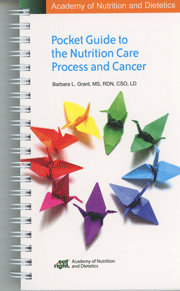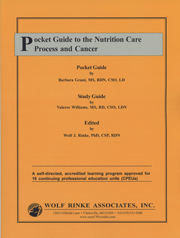| Pocket Guide to the Nutrition Care Process and Cancer
| C284 |
16 CPEUs |
HARD COPY |
$149.95
|
|
Easy-to-use reference on nutrition care for patients diagnosed with cancer. Founded on the Academy's Oncology Nutrition Evidence-Based Nutrition Practice Guidelines (ON EBNPG) and recommendations from other leading cancer-focused health organizations. Great resource to help you pass your Board Certification as a Specialist in Oncology Nutrition (CSO). Includes:
- Application of the Nutrition Care Process to cancer care, from nutrition screening and assessment through nutrition monitoring and evaluation.
- Obtaining and interpreting data to identify nutrition-related problems associated with cancer and its treatment.
- Determining nutrient and physical activity requirements.
- Using standardized terminology to label individuals' nutrition diagnoses.
- Developing nutrition prescriptions and choosing nutrition intervention strategies.
Share with a friend and Save! Click here for important information about
sharing.
To order an ADDITIONAL Reporting Form click below:
| C284F |
16 CPEUs |
REPORTING FORM |
$60.00 |
 |
Pocket Guide to the Nutrition Care Process and Cancer
© 2024 Wolf Rinke Associates. All rights reserved for this self-directed accredited learning activity. Reproduction in whole or part without written permission, except for brief excerpts, is prohibited.
LEARNING OBJECTIVES
Upon completion of this CPE activity you will be better able to:
-
Recommend foods that are appropriate for various nutrition impact symptoms;
-
Apply findings from recent research and evidence-based nutrition practice guidelines when counseling clients on vitamin/mineral/herbal supplements and cancer;
-
Identify common nutrition-related gastrointestinal issues and their common causes;
-
Assist clients in understanding the role of adequate nutrition and weight stability during cancer treatment;
-
Identify adequate and appropriate information during nutrition assessment;
-
Choose appropriate nutrition diagnosis based on nutrition assessment;
-
Prioritize nutrition diagnoses for intervention development;
-
Apply nutrition screening methods to practice and program development;
-
Prioritize resources and patient needs in the setting of limited staffing resources;
-
Identify characteristics of pre-cachexia and cancer cachexia;
-
Assess for malnutrition in patients with cancer;
-
Assist patients in addressing difficulties with food preparation or supply;
-
Identify acute and late effects of chemotherapy, radiation and surgery;
-
Suggest techniques to manage the impact of treatment effects on diet and nutritional status;
-
Evaluate nutrition-related laboratory values;
-
Identify impacts of chemotherapy and/or radiation on nutrition-related lab values;
-
Evaluate laboratory values to identify myelosuppression;
-
Discuss food safety principles in setting of immunosuppression;
-
Suggest diet modifications for myelosuppression;
-
Determine appropriate intervention for nutrition diagnosis;
-
Evaluate weight changes throughout treatment;
-
Assist clients in addressing surgical impacts on digestion and absorption;
-
Communicate physical activity recommendations with patients;
-
Develop individualized nutrition prescription for patients;
-
Determine appropriate monitoring and evaluation criteria for individuals;
-
Direct patients to evidence-based, reliable cancer resources.
ABOUT THE AUTHOR OF THE POCKET GUIDE
Barbara Grant, MS, RDN, CSO, LD, is the outpatient oncology dietitian nutritionist at Saint Alphonsus Cancer Care Center in Boise and Caldwell, Idaho, where she provides individualized nutritional counseling and survivorship classes for people with cancer. Barbara has over 32 years of experience in cancer nutrition and is a Certified Specialist in Oncology Nutrition.
Barbara received her Master of Science in Adult Education from the University of Idaho and her Bachelor of Science in Foods and Nutrition from Washington State University, and completed her dietetic internship at the University of Minnesota Hospitals and Clinics.
Barbara is past Chair of the Commission on Dietetic Registration (CDR), and is currently serving as Chair of CDR’s Competency Assurance Panel.
ABOUT THE AUTHOR OF THE STUDY GUIDE
Valaree Williams, MS, RD, CSO, LDN currently works as an outpatient clinical dietitian at University of Colorado Hospital in Aurora, Colorado. At UC Health, she provides nutrition services to patients at the Benign Heme, Blood Cancer and Bone Marrow Transplant services in Aurora, Colorado. Valaree has ten years of experience in cancer nutrition and is a Certified Specialist in Oncology Nutrition.
Valaree received her Master of Science in Health Sciences from Chatham University and her Bachelor of Science in Dietetics from Indiana University of Pennsylvania. Her dietetic internship was completed at the University of Pittsburgh Medical Center Presbyterian-Shadyside.
She currently serves as a member of Academy of Nutrition and Dietetics Academy Positions Committee and Quality Strategies Workgroup. Additionally, she serves on the Specialty Exam Workgroup for the Commission on Dietetic Registration Oncology Specialist Certification Exam.
If you prefer to order by phone, mail
or fax click below
or click here to contact us with
other questions.
For information about our other products and
services return to the sidebar at the top of the page.
|



